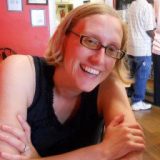If you’re looking for something fun and, better yet, free, to do this week, the City of Boston has your back—it’s hosting a nine-day arts festival all over town. I chatted with Israeli composer and performer Guy Mendilow, who will be playing the Boston Common with his sextet, the Guy Mendilow Ensemble, on Saturday, July 20, from 2-3:15 p.m., presented by New Center NOW. Guy just released a new album—in Ladino. Read on to learn more about the album and festival, plus find out the strangest gig Guy has ever played.

Outside the Box is a massive, nine-day festival of music, theater and dance. It’s bringing more than 200 events to Boston, and it is entirely free, which is fairly incredible! One of the artists I am excited to see is Shye Ben Tzur and the Rajasthan Gypsies, a group from India led by an Israeli ex-pat. We’ve played a number of festivals together, most recently Ashkenaz in Toronto, but I always miss them. Finally I’ll have a chance to catch their set because they are on the day after us. Between Shye’s group and mine we’ve got a mini UN going here—nationalities in various groups include India, Israel, Jordan, Palestine, Argentina, the UK, Italy, Japan and the U.S.
How did you end up making an album in Ladino? And, for those of us who don’t know, what is Ladino?
Ladino is both a culture and a language. A diving-in point is the end of an era: the final expulsion of the Jews from Spain in 1491 and from Portugal in 1497. This uprooting began migrations in which the Jews eventually settled in communities spanning the vast Ottoman Empire, from Northern African and the Mediterranean to the Balkans and beyond. Each community integrated words and expressions from the local language, including Greek, Slavic languages, Arabic, Turkish and Hebrew.
Wherever it is found, Judeo-Spanish is also a type of linguistic time capsule—the Spanish Jews preserved the lexis, syntax, morphology and phonology of medieval Spanish, as well as idioms, pronunciation and accent of words, which have long since vanished from Spain itself. Judeo-Spanish is still spoken by pockets of Jews, primarily in Israel, though it is considered an endangered language.
We’ve recorded two albums in Ladino, the second of which will be released in the fall. (You can hear preview cuts at guymendilow.com.) I’ve been working with Ladino music since 1999 and exclusively since 2010. This is music with which I grew up in Israel, but there is much more than childhood memories. It’s a love affair of the heart and the head. On the heart’s side—and this is first and foremost because, above all, I am a musician—I simply love so many of these melodies, the ways they seem both familiar and still surprising. On the head side, I find the story of the songs, of the language, fascinating.
This weekend’s show springboards off of songs mainly from the communities of Sarajevo and Salonika. The traditional source music is primarily from the early 20th century, though the lyrics of a few of these songs are much older, even pre-dating 1492. I ask compositional questions: What can I imagine the mood of the story, or the emotions of some of the characters, to be, despite the traditional ways the song would have been sung? It is risky to recast such old, rich material this way. We ricochet from tradition and into modern imagination. My hope is the resulting arrangements bring the stories to life in a way that will be vivid and fresh for our audiences, and for me.
I talked to you years ago when you were playing First Night in Boston. We just heard this week that the organization that runs First Night is closing due to a lack of funds. What are your memories of playing First Night?
We had a great time playing First Night. It was one of our first shows in Boston. I had just moved to the city, and I remember feeling so excited to be here. We played a family show and a general audience show at the Hynes Convention Center, and each was packed and saw CDs flying off the tables. It was thrilling, and even though we rang in the New Year in a loading dock, it was a real high. First Night is a beautiful community event and I am very sorry to hear that it may not continue. That is a real loss.
What’s the strangest gig you’ve ever played?
Several years back we were invited to play a festival at a nudist colony. The money wasn’t great and it involved quite a bit of travel, but I just could not pass up the opportunity to play a joke on my band, so I didn’t tell them a thing about it. Not a word—my gift to them. Our violinist, a lovely player from Japan, was asleep in the back of the van. She woke up as we drove in. There was a naked security guard, and then a whole mess of naked people. She just kept rubbing her eyes like she was still dreaming. She got out of the van and stood there silently, dazed, amazed, just looking around. And then she came up to me and hugged me and said something I’ll always remember. With astonished gratitude, she exclaimed: “Really? Thank you!”

This post has been contributed by a third party. The opinions, facts and any media content are presented solely by the author, and JewishBoston assumes no responsibility for them. Want to add your voice to the conversation? Publish your own post here. MORE


